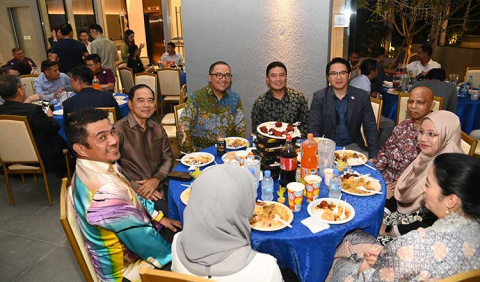
An early but joyous celebration of Deepavali – the Festival of Lights – was held on the 10th floor of the Gateway Hotel in Phnom Penh on Friday by the Malaysian Business Chamber of Cambodia (MBCC), joined by not only people of Hindu Indian background but also Cambodians and expats from many countries.
Deepavali, also known as Diwali, is India’s biggest and most important holiday of the year. The festival gets its name from the row (avali) of clay lamps (deepa) that Indians light outside their homes to symbolise the inner light that protects them from spiritual darkness.
Over the years, it has become a global festival that is also enjoyed by non-Hindu communities.
In Malaysia, Deepavali is a national festival and a public holiday celebrated by people all over the country.

Guests contributing to the Cambodian Mine Action and Victim Assistance Authority via the Wing Bank QR code. KT/Pann Rachana
It is one of the four major religious festivals celebrated in the country, which has been long known as a multicultural and multi-racial nation.
MBCC’s Friday celebration was presided over by its president Oknha Tan Khee Meng, while the guests of honour included ambassadors from Malaysia, Indonesia, and Brunei, as well as Senior Minister Ly Thuch, the First Vice-President of the Cambodian Mine Action and Victim Assistance Authority (CMAA). Over 200 guests attended the joyful event.
The evening began with a cocktail reception and networking, while Indian songs and music provided the entertainment. Authentic Indian cuisine — from chicken curry to biryani — chosen from various renowned outlets was served to the guests along with a free flow of beverages.
The celebration of Deepavali was also held with an act of humanity, as the guests could contribute to the demining action in Cambodia by scanning the Wing Bank QR code in order to help Cambodia achieve landmine-free status by 2025.

Guests at MBCC’s Deepavali celebration. KT/Pann Rachana
In his opening remark, Oknha Tan said he was delighted that the event was attended by so many people, almost twice as many as he had expected.
“This is a great occasion where we can celebrate Deepavali with our Indian friends,” he said. “Deepavali is not limited to only Indians; now that we look at it as Malaysian, it is one of our festivals and most important celebrations. It reflects on our Malaysian society, in which we show peace by being truly Asia and respecting our multi-culture and each other.”
Thuch said he was amazed by how Malaysians embrace each religious festival with open arms.
“People from different backgrounds come together, visiting their Hindu friends and celebrating this joyous occasion in the spirit of togetherness and happiness,” he said.
“This spirit of unity is not limited to Deepavali but extends to other festivals like Hari Raya Puasa, Chinese New Year, and Christmas as well,” he said.
Thuch added that by celebrating Deepavali, MBCC has passed on the joy of the festival to everyone in Cambodia.

MBCC President Oknha Tan Khee Meng speaking at the Deepavali celebration. KT/Pann Rachana
“What warms my heart even further is seeing Cambodians, Malays, Chinese, and Indians gathered here tonight,” he said. “It gives true meaning to the slogan ‘Malaysia is truly Asia’. The diversity and unity in this room are a testament to the beauty of Malaysia’s cultural tapestry.”
Approximately 2.75 million people of Indian origin (PIOs) make up 9% of the population of Malaysia. Tamil is spoken by about 2 million Indians living in Malaysia.
A sizable portion of PIOs are multilingual in Telugu, Malayalam, and Punjabi. Bengali, Urdu, and Gujarati-speaking PIOs are likewise less common.
About 225,000 Indian expatriates are thought to be residing in Malaysia.
The majority of the qualified foreign workers entering Malaysia include engineers, doctors, IT specialists, and others.
The Indian diaspora in Malaysia is highly involved in the country’s sociocultural environment. They are actively taking part in all of the mission’s key events and activities.
Meanwhile, according to the Malaysian Embassy, over 5,000 Malaysians are living and working in Cambodia, while there are about 500 companies run by Malaysian businesspeople and investors.




